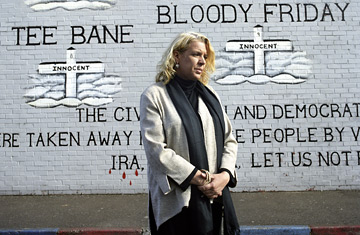
Arlene Healey, head of Belfasts Family Trauma Centre.
Every war has two battlefields: the one on which the fighting occurs and the one in the memories of the people who experienced it—a place where the shooting sometimes doesn't stop.
The end of Northern Ireland's famed Troubles—the sectarian bloodshed that claimed 3,700 lives—means peace for this long-tormented land. For some of the people who survived them, though, there's been no closure. Most of the killings remain unsolved; many bodies were never found.
"For those families," says Arlene Healey, 49, a Belfast-based family therapist, "there is no story about why your father was killed. Just a big silence." Silent too were those who were burned out of their homes or beaten.
Many survivors paid a price in depression and anxiety and turned to alcohol to cope. In 1998, Healey got the chance to do something about it when the government invited her to found the Family Trauma Centre (FTC). At first, there were few takers. "There's a saying here, 'Whatever you say, say nothing,'" Healey explains. But slowly, the queues started forming. Today the FTC is helping 250 families a year finish their stories.
Those stories can be terrible. One FTC client was a child in 1972 when her father was killed by a bomb. She was told he had been "blown to pieces," and she fretted about his getting into heaven in such a state. By the 35th anniversary of his death, she was crippled by anxiety for her children. Healey's team found forensic photos of her father and showed them to her. His body was intact.
"You would think that would be an awful thing, but it wasn't for her," says Healey. Peace can come in unexpected ways; Healey and the FTC are helping innocent victims of a resolved conflict find theirs.